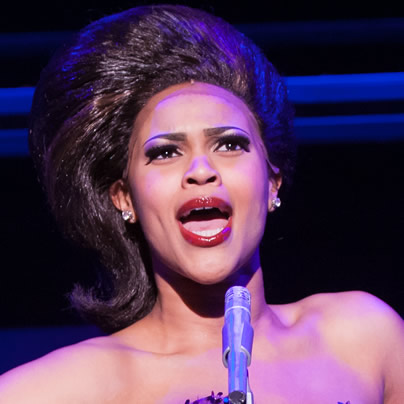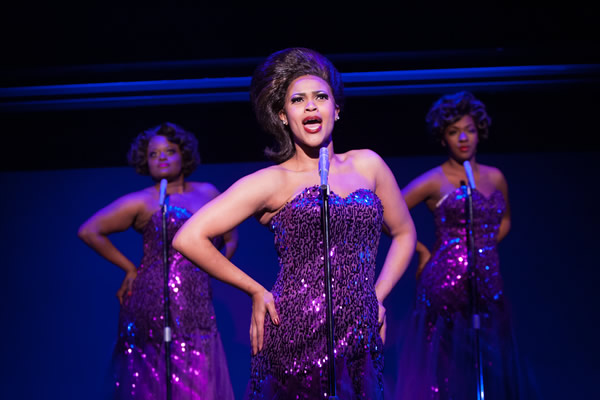Arts & Entertainment
First rate ‘Dreamgirls’ wows
Signature production full of unexpected delights, performances

‘Dreamgirls’
Signature Theatre
4200 Campbell Avenue, Arlington
Extended through Jan. 13, 2013
Tickets start at $40

Shayla Simmons, center, as Deena in ‘Dreamgirls.’ Nova Y. Payton, left, as Effie, and Crystal Joy as Lorrell, back her up. (Photo by Chrisopher Mueller; courtesy of Signature Theatre)
The production of “Dreamgirls” now onstage at Signature Theatre is a dazzling delight, a stunning reexamination of an iconic American musical. Talented director and choreographer Matthew Gardiner and his creative team skillfully rethink the show from the ground up, bringing great clarity, intensity and emotional depth to this powerful production, along with lots of sequins and theatrical magic.
“Dreamgirls,” which debuted on Broadway in 1981, was the last great work by legendary Broadway director and choreographer Michael Bennett, who died of complications from AIDS in 1987. The musical, with a sizzling score by Henry Krieger and strong book and lyrics by Tom Eyen, tells the story of the Dreams, a girl group from Chicago (loosely based on Diana Ross and the Supremes) who rise to international music stardom.
The show opens in 1962 when the “Dreamettes” lose a talent contest at the famous Apollo Theatre in New York City, but win a contract as back-up singers for the popular R&B star James “Thunder” Early. They also acquire a manager, used-car salesman Curtis Taylor, Jr., who has big plans for the group. Repackaged as the “Dreams,” the girls soon break out on their own. Curtis moves back-up singer Deena Jones into the lead, hoping that her sexy looks and sultry voice will attract a mainstream (i.e. white) audience. Despite the personal and professional cost to Effie White, the full-bodied and full-voiced original lead singer, “Deena Jones and the Dreams” conquer the charts.
Gardiner, the openly gay associate artistic director of Signature Theatre, brings a fresh eye to this well-known material. His work throughout is richly nuanced, alternating between the spectacular precision of big production numbers and the detailed intimacy of backstage numbers and book scenes. One of the great joys of this production is the sheer variety of performance styles that Gardiner deploys with great confidence and effectiveness: the slick polish of the onstage production numbers, the girls nervously making up the steps the first time they perform with Jimmy, Curtis prompting C.C. (Effie’s brother and the group’s songwriter) as they convince Jimmy to listen to their new sound, the eloquent staging of the group dynamics in “Family,” the elegant simplicity of Effie’s torch rendition of “One Night Only” followed by Deena’s delightfully boisterous disco rendition of the same song. Gardiner captures the full sweep of this classic American story by nailing down all the details.
Gardiner’s sure-footed work is made possible by the outstanding contributions of the design team of Frank Labovitz (costumes), Adam Koch (sets) and Chris Lee (lights). Labovitz’s splendid cavalcade of costumes is an ongoing visual treasure. His beautiful designs help tell the story by tracking the passing years and the changing circumstances of the characters and do so with great visual flair. Koch’s two-tiered set design lets the action move fluidly from backstage to onstage at various performances venues around the country. The set changes are as carefully choreographed as the other movements and just as much fun to watch (although the occasional wobbling of the central hydraulic platform can be a little scary and distracting). Lee’s light design is equally stunning, and together, the design team creates an appealing and highly theatrical whirlwind of shifting perspectives, lighting magic and quick changes.
But any production of “Dreamgirls” depends on its Effie, and Signature Theatre is blessed with the amazing powerhouse performance of D.C. native Nova Y. Payton. Following in the wake of superstars like Jennifer Holliday (a Tony winner in the original Broadway production), Jennifer Hudson (who won an Oscar for her performance in the movie) and Lilias White (who wowed audiences in the famous concert recording), Payton makes the role thoroughly and completely her own. Her work in this show is simply stunning, full of fascinating choices and fresh insights. She purrs when you might expect her to roar, and when she does roar, she blows the roof off the theater.
Payton’s richly detailed acting captures every aspect of the complex character: her love of performing, her prickly pride and deep resentments, her self-destructive tantrums and brave persistence in the face of adversity. Her performance of the show’s signature number “And I Am Telling You I’m Not Going” is devastating in its soaring delivery and its searing pain and vulnerability. In an evening of striking images, the most indelible is a deeply wounded Effie turning to watch the reconstituted Dreams perform without her on the balcony above her. It is a moment of brilliant stagecraft.
Payton’s dynamite performance is matched by Cedric Neal as James “Thunder” Early, who finds unexpected depths in a flashy character inspired by James Brown. His Jimmy is a man of deep passion for his music and for the ladies in his life. His direct interactions with the audience are a bold and delightful choice and his onstage meltdown is a moving spectacle of pride, defiance and self-destruction.
As the third member of the Dreams, and Jimmy’s mistress, Crystal Joy is wonderful as Lorrell Robinson, who tries to play peacemaker between the warring backstage factions. She brings sass, humor and style to a character that can easily fade into the background. Joy subtly builds Lorrell from a star-struck teenager to a mature woman, and her love for Jimmy is as deeply heart-felt as her frustration with his refusal to leave his wife. Shayla Simmons brings similar strengths to her winning performance as Deena, especially in capturing her shifting relationship with Effie and in fleshing out her development from back-up singer to reluctant lead to world-class diva.
It’s magical when first-rate material gets a first-rate production, and that is certainly the case with this show. Krieger and Eyen have created a clear-eyed yet loving portrayal of the joys of performing and the perils of show business, and a rich exploration of the challenges facing black performers when Motown became mainstream. Signature Theatre has taken a great leap with this re-invention of this ambitious musical, and that leap has certainly paid off.
Photos
PHOTOS: Montgomery County Pride in the Plaza
LGBTQ celebration held in downtown Silver Spring

Montgomery County Pride in the Plaza was held on Sunday, June 29 at Veterans Plaza in Silver Spring, Md.
(Washington Blade photos by Michael Key)























The fifth annual Fredericksburg Pride march and festival was held on Saturday, June 28. A march through the streets of downtown Fredericksburg, Va. was followed by a festival at Riverfront Park.
(Washington Blade photos by Michael Key)



















India
Anaya Bangar challenges ban on trans women in female cricket teams
Former Indian cricketer Sanjay Bangar’s daughter has received support

Anaya Bangar, the daughter of former Indian cricketer Sanjay Bangar, has partnered with the Manchester Metropolitan University Institute of Sport in the U.K. to assess her physiological profile following her gender-affirming surgery and undergoing hormone replacement therapy.
From January to March 2025, the 23-year-old underwent an eight-week research project that measured her glucose levels, oxygen uptake, muscle mass, strength, and endurance after extensive training.
The results, shared via Instagram, revealed her metrics align with those of cisgender female athletes, positioning her as eligible for women’s cricket under current scientific standards. Bangar’s findings challenge the International Cricket Council’s 2023 ban on transgender athletes in women’s cricket, prompting her to call for a science-based dialogue with the Board of Control for Cricket in India and the ICC to reform policies for trans inclusion.
“I am talking with scientific evidence in my hand,” Bangar said in an interview posted to her Instagram page. “So, I hope, this makes an impact and I will be hoping to BCCI and ICC talking with me and discussing this further.”
On Nov. 21, 2023, the ICC enacted a controversial policy barring trans women from international women’s cricket. Finalized after a board meeting in Ahmedabad, India, the regulation prohibits any trans player who has experienced male puberty from competing, irrespective of gender-affirming surgery or hormone therapy. Developed through a 9-month consultation led by the ICC’s Medical Advisory Committee, the rule aims to safeguard the “integrity, safety, and fairness” of women’s cricket but has drawn criticism for excluding athletes like Canada’s Danielle McGahey, the first trans woman to play internationally. The policy, which allows domestic boards to set their own rules, is slated for review by November 2025.
Bangar shared a document on social media verifying her participation in a physiological study at the Manchester Metropolitan University Institute of Sport, conducted from Jan. 20 to March 3, 2025, focused on cricket performance. The report confirmed that her vital metrics — including hemoglobin, blood glucose, peak power, and mean power — aligned with those of cisgender female athletes. Initially, her fasting blood glucose measured 6.1 mmol/L, slightly above the typical non-diabetic range of 4.0–5.9 mmol/L, but subsequent tests showed it normalized, reinforcing the study’s findings that her physical profile meets female athletic standards.
“I am submitting this to the BCCI and ICC, with full transparency and hope,” said Bangar. “My only intention is to start a conversation based on facts not fear. To build space, not divide it.”
In a letter to the BCCI and the ICC, Bangar emphasized her test results from the Manchester Metropolitan University study. She explained that the research aimed to assess how hormone therapy had influenced her strength, stamina, hemoglobin, glucose levels, and overall performance, benchmarked directly against cisgender female athletic standards.
Bangar’s letter to the BCCI and the ICC clarified the Manchester study was not intended as a political statement but as a catalyst for a science-driven dialogue on fairness and inclusion in cricket. She emphasized the importance of prioritizing empirical data over assumptions to shape equitable policies for trans athletes in the sport.
Bangar urged the BCCI, the world’s most influential cricket authority, to initiate a formal dialogue on trans women’s inclusion in women’s cricket, rooted in medical science, performance metrics, and ethical fairness. She called for the exploration of eligibility pathways based on sport-specific criteria, such as hemoglobin thresholds, testosterone suppression timelines, and standardized performance testing. Additionally, she advocated for collaboration with experts, athletes, and legal advisors to develop policies that balance inclusivity with competitive integrity.
“I am releasing my report and story publicly not for sympathy, but for truth. Because inclusion does not mean ignoring fairness, it means measuring it, transparently and responsibly,” said Bangar in a letter to the BCCI. “I would deeply appreciate the opportunity to meet with you or a representative of the BCCI or ICC to present my findings, discuss possible policy pathways, and work towards a future where every athlete is evaluated based on real data, not outdated perceptions.”
Before her transition, Bangar competed for Islam Gymkhana in Mumbai and Hinckley Cricket Club in the U.K., showcasing her talent in domestic cricket circuits. Her father, Sanjay Bangar, was a dependable all-rounder for the Indian national cricket team from 2001 to 2004, playing 12 test matches and 15 One Day Internationals. He later served as a batting coach for the Indian team from 2014 to 2019, contributing to its strategic development.
Cricket in India is a cultural phenomenon, commanding a fanbase of more than 1 billion, with more than 80 percent of global cricket viewership originating from the country.
The International Cricket Council, the sport’s governing body, oversees 12 full member nations and more than 90 associate members, with the U.S. recently gaining associate member status in 2019 and co-hosting the 2024 ICC Men’s T20 World Cup. The BCCI generated approximately $2.25 billion in revenue in the 2023–24 financial year, primarily from the Indian Premier League, bilateral series, and ICC revenue sharing. The ICC earns over $3 billion from media rights in India alone for the 2024–27 cycle, contributing nearly 90 percent of its global media rights revenue, with the BCCI receiving 38.5 percent of the ICC’s annual earnings, approximately $231 million per year.
Women’s cricket in India enjoys a growing fanbase, with over 300 million viewers for the Women’s Premier League in 2024, making it a significant driver of the sport’s global popularity. The International Cricket Council oversees women’s cricket in 12 full member nations and over 90 associate members, with the U.S. fielding a women’s team since gaining associate status in 2019 and competing in ICC events like the 2024 Women’s T20 World Cup qualifiers. The BCCI invests heavily in women’s cricket, allocating approximately $60 million annually to the WPL and domestic programs in 2024–25, while contributing to the ICC’s $20 million budget for women’s cricket development globally. India’s media market for women’s cricket, including WPL broadcasting rights, generated $120 million in 2024, accounting for over 50 percent of the ICC’s women’s cricket media revenue.
“As a woman, I feel when someone says that they are women, then they are, be trans or cis. A trans woman is definitely the same as a cis woman emotionally and in vitals, and specially, when someone is on hormone replacement therapy. Stopping Anaya Bangar from playing is discrimination and violation of her rights. It is really sad and painful that every trans woman need to fight and prove their identity everywhere,” said Indrani Chakraborty, an LGBTQ rights activist and a mother of a trans woman. “If ICC and BCCI is stopping her from playing for being transgender, then I will say this to be their lack of awareness and of course the social mindsets which deny acceptance.”
Chakraborty told the Blade that Bangar is an asset, no matter what. She said that the women’s cricket team will only benefit by participation, but the discriminating policies are the hindrance.
“Actually the transgender community face such discrimination in every sphere. In spite of being potent, they face rejection. This is highly inhuman. These attitudes is regressive and will never let to prosper. Are we really in 2025?,” said Chakraborty. “We, our mindset and the society are the issues. We, as a whole, need to get aware and have to come together for getting justice for Anaya. If today, we remain silent, the entire community will be oppressed. Proper knowledge of gender issues need to be understood.”
The BCCI and the International Cricket Council have not responded to the Blade’s repeated requests for comment.
-

 District of Columbia5 days ago
District of Columbia5 days agoActivists protest outside Hungarian Embassy in DC
-

 Virginia4 days ago
Virginia4 days agoSpanberger touts equality, reproductive rights in Arlington
-

 Books4 days ago
Books4 days agoTwo new books on dining out LGBTQ-style
-

 Theater4 days ago
Theater4 days ago‘Andy Warhol in Iran’ a charming look at intersection of art, politics












